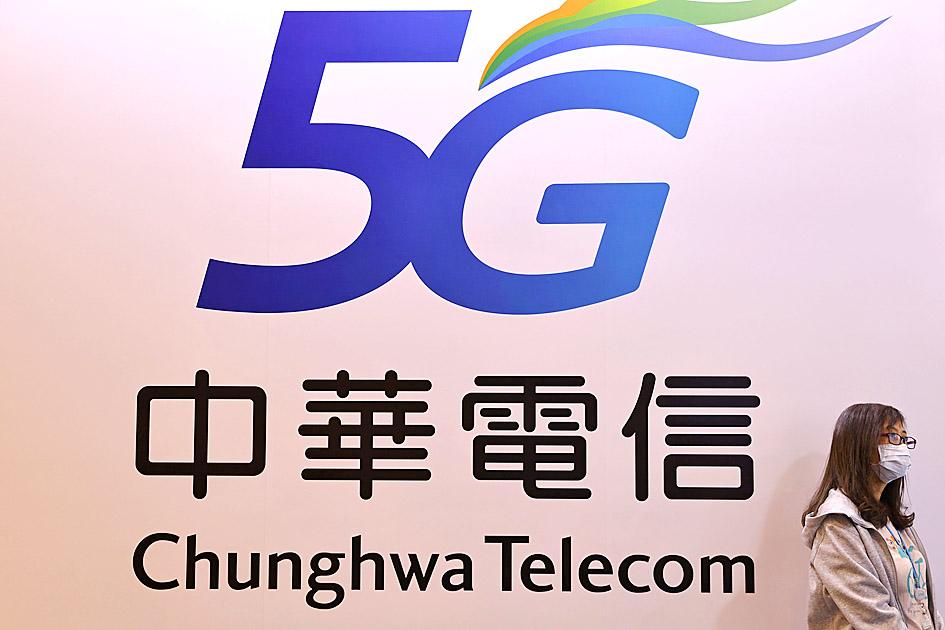Chunghwa Telecom Co (中華電信), the nation’s biggest telecom service provider, on Monday reported that net profit last year increased 1.9 percent following the debut of 5G services, its first annual growth since 2015.
Net profit expanded to NT$33.42 billion (US$1.17 billion), up from NT$32.79 billion in 2019, and surpassed the company’s forecast of NT$30.91 billion to NT$32.47 billion.
That translated into earnings per share of NT$4.31, up from NT$4.23 in 2019.

Photo: Ann Wang, Reuters
Revenue last year remained little changed at NT$207.61 billion, up from NT$207.52 billion in 2019, but falling short of the company’s guidance of NT$214.1 billion to NT$215.29 billion.
Revenue from corporate customers, value-added services and handset sales offset a continual decline in revenue from voice calls, mobile services and roaming services, the company said, adding that 5G services gradually boosted its average revenue per user (ARPU).
Taiwan Mobile Co’s (台灣大) net profit last year fell 9.54 percent to NT$11.29 billion, down from NT$12.48 billion in 2019, due to 5G spectrum amortization and spending on 5G infrastructure.
That translated into earnings per share of NT$4.01, down from NT$4.51 in 2019, the company said.
Last year’s profit was better than the firm’s forecast of NT$9.47 billion, or earnings per share of NT$3.96.
By the end of last year, Taiwan Mobile had 400,000 5G subscribers, it said, adding that the higher tariffs helped slow a decline in mobile service revenue.
For the whole of last year, its postpaid ARPU fell to NT$657 from NT$722 in 2019, the firm said.
Taiwan Mobile’s revenue increased 6.78 percent to NT$132.86 billion, from NT$124.42 billion in 2019, thanks to a greater contribution from its e-commerce subsidiary Momo.com Inc (富邦媒體). More than half of Taiwan Mobile’s revenue came from Momo.com, which saw revenue soar about 30 percent to NT$67.2 billion last year from NT$51.83 billion in 2019.
However, Taiwan Mobile’s revenue fell below its guidance of NT$134.53 billion.
Far EasTone Telecommunications Co’s (遠傳電信) net profit last year fell 4.24 percent to NT$8.35 billion — beating its guidance of NT$8.02 billion — from NT$8.72 billion in 2019.
That translated into earnings per share of NT$2.56, down from NT$2.68 in 2019, the company said.
Revenue fell 5.21 percent to NT$79.5 billion from NT$83.87 billion in 2019 — missing the company’s guidance of NT$86.76 billion — despite annual growth of 13 percent from new services, including information and communications technology solutions, cloud-based programs and Internet-of-Things services.

SEMICONDUCTORS: The German laser and plasma generator company will expand its local services as its specialized offerings support Taiwan’s semiconductor industries Trumpf SE + Co KG, a global leader in supplying laser technology and plasma generators used in chip production, is expanding its investments in Taiwan in an effort to deeply integrate into the global semiconductor supply chain in the pursuit of growth. The company, headquartered in Ditzingen, Germany, has invested significantly in a newly inaugurated regional technical center for plasma generators in Taoyuan, its latest expansion in Taiwan after being engaged in various industries for more than 25 years. The center, the first of its kind Trumpf built outside Germany, aims to serve customers from Taiwan, Japan, Southeast Asia and South Korea,

Gasoline and diesel prices at domestic fuel stations are to fall NT$0.2 per liter this week, down for a second consecutive week, CPC Corp, Taiwan (台灣中油) and Formosa Petrochemical Corp (台塑石化) announced yesterday. Effective today, gasoline prices at CPC and Formosa stations are to drop to NT$26.4, NT$27.9 and NT$29.9 per liter for 92, 95 and 98-octane unleaded gasoline respectively, the companies said in separate statements. The price of premium diesel is to fall to NT$24.8 per liter at CPC stations and NT$24.6 at Formosa pumps, they said. The price adjustments came even as international crude oil prices rose last week, as traders

SIZE MATTERS: TSMC started phasing out 8-inch wafer production last year, while Samsung is more aggressively retiring 8-inch capacity, TrendForce said Chipmakers are expected to raise prices of 8-inch wafers by up to 20 percent this year on concern over supply constraints as major contract chipmakers Taiwan Semiconductor Manufacturing Co (TSMC, 台積電) and Samsung Electronics Co gradually retire less advanced wafer capacity, TrendForce Corp (集邦科技) said yesterday. It is the first significant across-the-board price hike since a global semiconductor correction in 2023, the Taipei-based market researcher said in a report. Global 8-inch wafer capacity slid 0.3 percent year-on-year last year, although 8-inch wafer prices still hovered at relatively stable levels throughout the year, TrendForce said. The downward trend is expected to continue this year,

POWERING UP: PSUs for AI servers made up about 50% of Delta’s total server PSU revenue during the first three quarters of last year, the company said Power supply and electronic components maker Delta Electronics Inc (台達電) reported record-high revenue of NT$161.61 billion (US$5.11 billion) for last quarter and said it remains positive about this quarter. Last quarter’s figure was up 7.6 percent from the previous quarter and 41.51 percent higher than a year earlier, and largely in line with Yuanta Securities Investment Consulting Co’s (元大投顧) forecast of NT$160 billion. Delta’s annual revenue last year rose 31.76 percent year-on-year to NT$554.89 billion, also a record high for the company. Its strong performance reflected continued demand for high-performance power solutions and advanced liquid-cooling products used in artificial intelligence (AI) data centers,